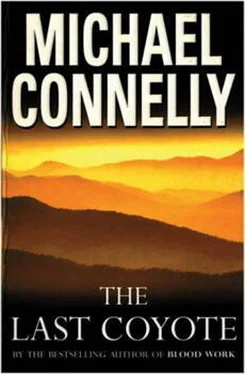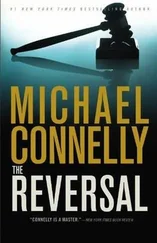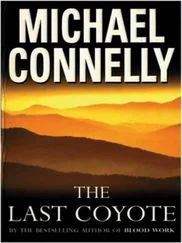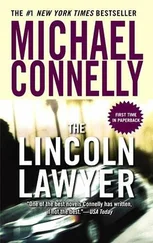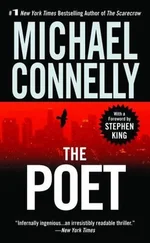Micael Connelly - The Last Coyote
Здесь есть возможность читать онлайн «Micael Connelly - The Last Coyote» весь текст электронной книги совершенно бесплатно (целиком полную версию без сокращений). В некоторых случаях можно слушать аудио, скачать через торрент в формате fb2 и присутствует краткое содержание. Жанр: Полицейский детектив, на английском языке. Описание произведения, (предисловие) а так же отзывы посетителей доступны на портале библиотеки ЛибКат.
- Название:The Last Coyote
- Автор:
- Жанр:
- Год:неизвестен
- ISBN:нет данных
- Рейтинг книги:4 / 5. Голосов: 1
-
Избранное:Добавить в избранное
- Отзывы:
-
Ваша оценка:
- 80
- 1
- 2
- 3
- 4
- 5
The Last Coyote: краткое содержание, описание и аннотация
Предлагаем к чтению аннотацию, описание, краткое содержание или предисловие (зависит от того, что написал сам автор книги «The Last Coyote»). Если вы не нашли необходимую информацию о книге — напишите в комментариях, мы постараемся отыскать её.
The Last Coyote — читать онлайн бесплатно полную книгу (весь текст) целиком
Ниже представлен текст книги, разбитый по страницам. Система сохранения места последней прочитанной страницы, позволяет с удобством читать онлайн бесплатно книгу «The Last Coyote», без необходимости каждый раз заново искать на чём Вы остановились. Поставьте закладку, и сможете в любой момент перейти на страницу, на которой закончили чтение.
Интервал:
Закладка:
On Hercules Drive, he slowed outside the gate in front of Mittel's grounded spaceship. The gate was closed and there was yellow police-line tape still hanging from it. Bosch saw no cars in the driveway. It was quiet and peaceful. And soon he knew that a for sale sign would be erected and the next genius would move in and think he was master of all he surveyed.
Bosch drove on. Mittel's place wasn't what he really wanted to see, anyway.
Fifteen minutes later Bosch came around the familiar turn on Woodrow Wilson but immediately found things unfamiliar. His house was gone, its disappearance as glaring in the landscape as a tooth missing from a smile.
At the curb in front of his address were two huge construction waste bins filled with splintered wood, mangled metal and shattered glass, the debris of his home. A mobile storage container had also been placed at the
curb and Bosch assumed — hoped — it contained the salvageable property removed before the house was razed.
He parked and walked over to the flagstone path that formerly had led to his front door. He looked down and all that was left were the six pylons that poked out of the hillside like tombstones. He could rebuild upon these. If he wanted.
Movement in the acacia trees near the footings of the pylons caught his eye. He saw a flash of brown and then the head of a coyote moving slowly through the brush. It never heard Bosch or looked up. Soon it was gone. Harry lost sight of it in the brush.
He spent another ten minutes there, smoking a cigarette and waiting, but he saw nothing else. He then said a silent good-bye to the place. He had the feeling he wouldn't be back.
When Bosch got to the Mark Twain, the city's morning was just starting. From his room he heard a garbage truck making its way down the alley, taking away another week's debris. It made him think of his house again, fitted nicely into two dumpsters. Thankfully, the sound of a siren distracted him. He could identify it as a squad car as opposed to a fire engine. He knew he'd get a lot of that with the police station just down the street. He moved about his two rooms and felt restless and out of it, as if life was passing by while he was stuck here. He made coffee with the machine he had brought from home and it only served to make him more jittery.
He tried the paper again but there was nothing of real interest to him except the story he had already read on the front page. He paged through the thin Metro section anyway and saw a report that the county commission chambers were being outfitted with bulletproof desk blotters that the commissioners could hold up in front of them in the event a maniac came in spraying bullets. He threw the section aside and picked up the front section again.
Bosch reread the story about his investigation and couldn't escape a growing feeling that something was wrong, that something was left out or incomplete. Keisha Russell's reporting had been fine. That wasn't the
problem. The problem was in seeing the story in words, in print. It didn't seem as convincing to him as it had been when he recounted it for her or for Irving or even for himself.
He put the newspaper aside, leaned back on the bed and closed his eyes. He went over the sequence of events once more and in doing so finally realized the problem that gnawed at him was not in the paper but in what Mittel had said to him. Bosch tried to recall the words exchanged between them on the manicured lawn behind the rich man's house. What had really been said there? What had Mittel admitted to?
Bosch knew that at that moment on the lawn, Mittel was in a position of seeming invulnerability. He had Bosch captured, wounded and doomed before him. His attack dog, Vaughn, stood ready with a gun to Bosch's back. In that situation, Bosch believed there would be no reason for a man of Mittel's ego to hold back. And, in fact, he had not held back. He had boasted of his scheme to control Conklin and others. He had freely, though indirectly, admitted that he had caused the deaths of Conklin and Pounds. But despite those admissions, he had not done the same when it came to the killing of Marjorie Lowe.
Through the fragmented images of that night, Bosch tried to recall the exact words said and couldn't quite get to them. His visual recollection was good. He had Mittel standing in front of the blanket of lights. But the words weren't there. Mittel's mouth moved but Bosch couldn't get the words. Then, finally, after working at it for a while, it came to him. He had it. Opportunity. Mittel had called her death an opportunity. Was that an acknowledgement of culpability? Was he saying he killed her or had her killed? Or was he simply admitting that her death presented an opportunity for him to take advantage of?
Bosch didn't know and not knowing felt like a heavy
weight in his chest. He tried to put it out of his mind and eventually started drifting off toward sleep. The sounds of the city outside, even the sirens, were comforting. He was at the threshold of unconsciousness, almost there, when he suddenly opened his eyes.
'The prints,' he said out loud.
Thirty minutes later he was shaved, showered and in fresh clothes heading downtown. He had his sunglasses on and he checked himself in the mirror. His battered eyes were hidden. He licked his fingers and pressed his curly hair down to better cover the shaved spot and the stitches in his scalp.
At County-USC Medical Center, he drove through the back lot to the parking slots nearest the rear garage bays of the Los Angeles County medical examiner's office. He walked in through one of the open garage doors and waved to the security guard, who knew him by sight and nodded back. Investigators weren't supposed to go in the back way but Bosch had been doing it for years. He wasn't going to stop until someone made a federal case out of it. The minimum-wage guard was an unlikely candidate to do that.
He went up to the investigators' lounge on the second floor, hoping not only that there would be someone there he knew but, more important, someone Bosch hadn't alienated over the years.
He swung the door open and immediately was hit with the smell of fresh coffee. But the room was bad news. Only Larry Sakai was in the room, sitting at a table with newspapers spread across it. He was a coroner's investigator Bosch had never really liked and the feeling was mutual.
'Harry Bosch,' Sakai said after looking up from the newspaper he held in his hands. 'Speak of the devil, I'm reading about you here. Says here you're in the hospital.'
'Nah, I'm here, Sakai. See me? Where's Hounchell and Lynch? Either of them around?'
Hounchell and Lynch were two investigators who Bosch knew would do him a favor without having to think about it too long. They were good people.
'Nah, they're out baggin' and taggin'. Busy morning. Guess things are picking up again.'
Bosch had heard a rumor through the grapevine that while removing victims from one of the collapsed apartment buildings after the earthquake, Sakai had gone in with his own camera and taken photos of people dead in their beds — the ceilings crushed down on top of them. He then sold the prints to the tabloid newspapers under a false name. That was the kind of guy he was. 'Anybody else around?' 'No, Bosch, jus' me. Whaddaya want?' 'Nothing.'
Bosch turned back to the door, then hesitated. He needed to make the print comparison and didn't want to wait. He looked back at Sakai.
'Look, Sakai, I need a favor. You want to help me out? I'll owe you one.'
Sakai leaned forward in his chair. Bosch could see just the point of a toothpick poking out between his lips.
'I don't know, Bosch, having you owe me one is like having the old whore with AIDS say she'll give me a free one if I pay for the first.'
Sakai laughed at the comparison he had created. 'Okay, fine.'
Читать дальшеИнтервал:
Закладка:
Похожие книги на «The Last Coyote»
Представляем Вашему вниманию похожие книги на «The Last Coyote» списком для выбора. Мы отобрали схожую по названию и смыслу литературу в надежде предоставить читателям больше вариантов отыскать новые, интересные, ещё непрочитанные произведения.
Обсуждение, отзывы о книге «The Last Coyote» и просто собственные мнения читателей. Оставьте ваши комментарии, напишите, что Вы думаете о произведении, его смысле или главных героях. Укажите что конкретно понравилось, а что нет, и почему Вы так считаете.
